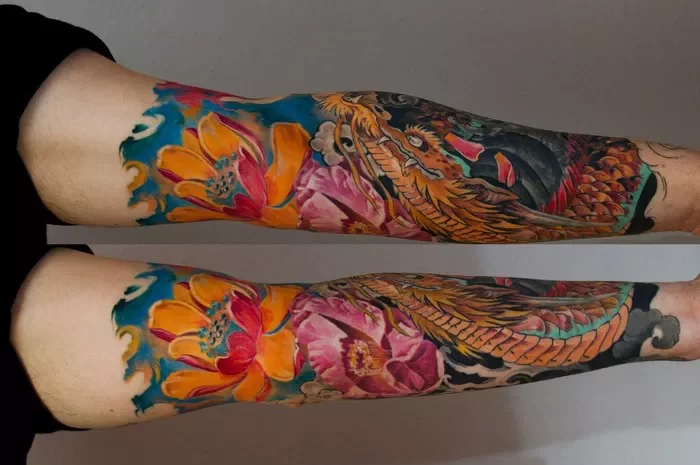Tattoos have long been a form of self-expression, representing various aspects of identity, beliefs, and culture. Among the multitude of tattoo designs available, the dragon tattoo stands out as one of the most iconic and versatile. However, there’s a prevailing question surrounding its gender association: are dragon tattoos feminine? This inquiry delves beyond mere aesthetics into deeper cultural and societal perceptions. In this article, we’ll explore the intricate relationship between gender, symbolism, and the dragon tattoo.
Understanding the Symbolism of Dragon Tattoos
To comprehend the gender connotations of dragon tattoos, it’s crucial to dissect their symbolism. Dragons hold significant symbolism in various cultures worldwide. In many Eastern traditions, dragons are revered as symbols of power, wisdom, and protection. They often represent balance, with their dual nature embodying both destructive and benevolent forces.
In Western cultures, dragons have historically been depicted as fearsome creatures, synonymous with chaos and destruction. However, contemporary interpretations have softened this perception, imbuing dragons with traits such as strength, resilience, and independence.
Gender Perceptions in Tattoo Culture
Tattoo culture has evolved significantly over the years, transcending its association with rebellion and counterculture to become widely accepted as a legitimate form of art and self-expression. Yet, gender stereotypes persist within this realm, influencing the types of tattoos individuals choose and the meanings attributed to them.
Traditionally, tattoos have been associated with masculinity, with designs like skulls, anchors, and tribal motifs often perceived as inherently masculine. Conversely, floral patterns, butterflies, and other delicate designs have been categorized as feminine. However, societal attitudes towards gender and self-expression have shifted, leading to a more fluid understanding of what constitutes “masculine” or “feminine” tattoos.
The Gender Dynamics of Dragon Tattoos
When it comes to dragon tattoos specifically, gender perceptions can vary significantly depending on cultural context and personal interpretation. In some cultures, dragons are associated with masculinity due to their portrayal as powerful and dominant creatures. As such, men may gravitate towards dragon tattoos as symbols of strength, courage, and virility.
However, this traditional association doesn’t preclude women from embracing dragon tattoos. In fact, many women choose dragon designs to reclaim power and agency traditionally associated with masculinity. For some, a dragon tattoo may symbolize resilience in the face of adversity or a connection to their inner strength and fierceness.
Moreover, the depiction of dragons in tattoo art can influence its perceived gender association. A stylized, intricate dragon design may appeal to individuals of any gender, transcending traditional notions of masculinity or femininity. Additionally, the placement of the tattoo can also influence its perceived gender association, with larger, more elaborate designs often perceived as more masculine, while smaller, more delicate designs may be seen as more feminine.
Challenging Gender Stereotypes Through Tattoo Art
In recent years, there has been a growing movement within the tattoo community to challenge traditional gender stereotypes and norms. Tattoo artists and enthusiasts alike are pushing boundaries, creating designs that defy gender categorization and celebrate individuality.
The rise of gender-neutral and gender-inclusive tattoo designs reflects a broader cultural shift towards embracing diversity and rejecting binary notions of gender. Dragon tattoos, with their multifaceted symbolism and universal appeal, are at the forefront of this movement. They serve as powerful symbols of empowerment, transcending gender boundaries and inviting individuals of all genders to embrace their inner strength and resilience.
Conclusion
In conclusion, the question of whether dragon tattoos are feminine is not easily answered. While traditionally associated with masculinity due to their symbolism of power and dominance, dragon tattoos hold universal appeal and can be embraced by individuals of any gender.
In a society that is increasingly challenging traditional gender norms and celebrating diversity, the gender association of tattoos is becoming less relevant. Instead, what matters most is the personal significance and meaning behind the tattoo. Whether it’s a symbol of strength, resilience, or simply a piece of art that speaks to the individual, the beauty of tattoo culture lies in its ability to transcend gender and unite people through shared experiences of self-expression and identity. So, are dragon tattoos feminine? The answer is as fluid and multifaceted as the dragons themselves.

